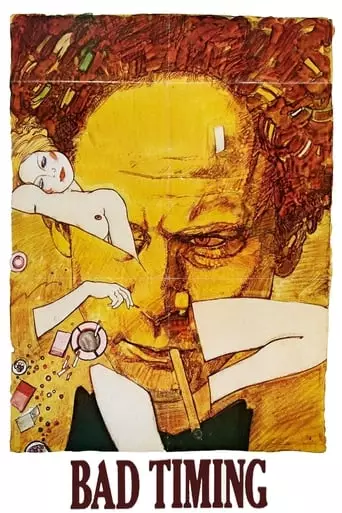
Bad Timing (1980) Watch Online Free
Alex Linden is a psychiatrist living in Vienna who meets Milena Flaherty though a mutual friend. Though Alex is quite a bit older than Milena, he’s attracted to her young, carefree spirit. Despite the fact that Milena is already married, their friendship quickly turns into a deeply passionate love affair that threatens to overtake them both. When Milena ends up in the hospital from an overdose, Alex is taken into custody by Inspector Netusil.
Bad Timing (1980), directed by Nicolas Roeg, is a psychological drama that explores the tumultuous relationship between two Americans in Vienna. The film’s nonlinear narrative structure mirrors the disjointed, chaotic nature of the characters’ lives. At its core, the film centers on Dr. Alex Linden (Art Garfunkel), a psychoanalyst, and Milena Flaherty (Theresa Russell), a troubled young woman battling addiction and emotional instability. The film opens with Milena’s overdose, leading to an investigation by a detective (Harvey Keitel) who uncovers the disturbing details of her relationship with Alex.
The film’s plot unfolds through a series of flashbacks, presenting fragmented glimpses of their affair, filled with power struggles, manipulation, and emotional turmoil. The relationship is far from conventional; Alex’s professional detachment fails to shield him from the destructive forces of his attraction to Milena, and Milena’s own mental health issues exacerbate the situation. The story ultimately reveals the dark consequences of their toxic dynamic, with Alex’s inability to act decisively in Milena’s moment of crisis leading to her collapse.
Bad Timing tackles themes of obsession, control, and the destructive nature of unhealthy relationships. The film delves into the psychological complexities of both protagonists, particularly Alex’s role as a manipulative figure disguised as a compassionate professional. It also explores Milena’s vulnerability, questioning whether she is a victim of circumstance or a participant in her own downfall.
The film’s nonlinear storytelling emphasizes the fractured nature of their relationship, highlighting the emotional and psychological disintegration over time. Roeg’s use of editing techniques, such as flashbacks and repeated sequences, intensifies the sense of confusion and disorientation, mirroring the characters’ spiraling descent into chaos. The relationship is not just a love story but a tragic exploration of dependency, addiction, and emotional abuse.
Bad Timing remains one of Nicolas Roeg’s most controversial and enigmatic films. Its dark portrayal of a dysfunctional relationship and its disturbing narrative structure challenged audiences and critics alike. The film’s raw, unflinching portrayal of mental health issues and the complexities of human relationships was groundbreaking at the time, though it received mixed reviews. While some praised its boldness and complex storytelling, others criticized it for being exploitative and shallow.
Despite its initial mixed reception, Bad Timing has garnered a cult following over the years, largely due to its unique approach to narrative and its powerful performances, especially by Theresa Russell. The film’s impact can be seen in its influence on later psychological thrillers and its ability to provoke deep reflections on the darker sides of human relationships.
Watching Bad Timing will leave you with a sense of discomfort and introspection. The film is not easy to digest—it challenges conventional notions of love and relationships, making it an unsettling experience. The portrayal of manipulation and obsession may provoke feelings of unease, and the fragmented narrative may leave you with lingering questions about the characters’ motivations and actions.
The movie’s raw emotional intensity, combined with its dark themes, will likely evoke a mix of fascination and discomfort. You may feel a sense of sadness for the characters, particularly Milena, whose struggles are exacerbated by her toxic relationship with Alex. However, you may also feel frustration, as the film offers no easy resolutions or comforting answers. Instead, it forces the viewer to confront the complexities of human relationships in their most painful and destructive forms.
In conclusion, Bad Timing is a film that demands engagement and reflection. It’s not an easy watch, but its bold storytelling and exploration of dark themes make it a compelling piece of cinema that will stay with you long after the credits roll. Whether you find it brilliant or distasteful, it’s a film that forces you to reckon with the darker aspects of love and human connection.
